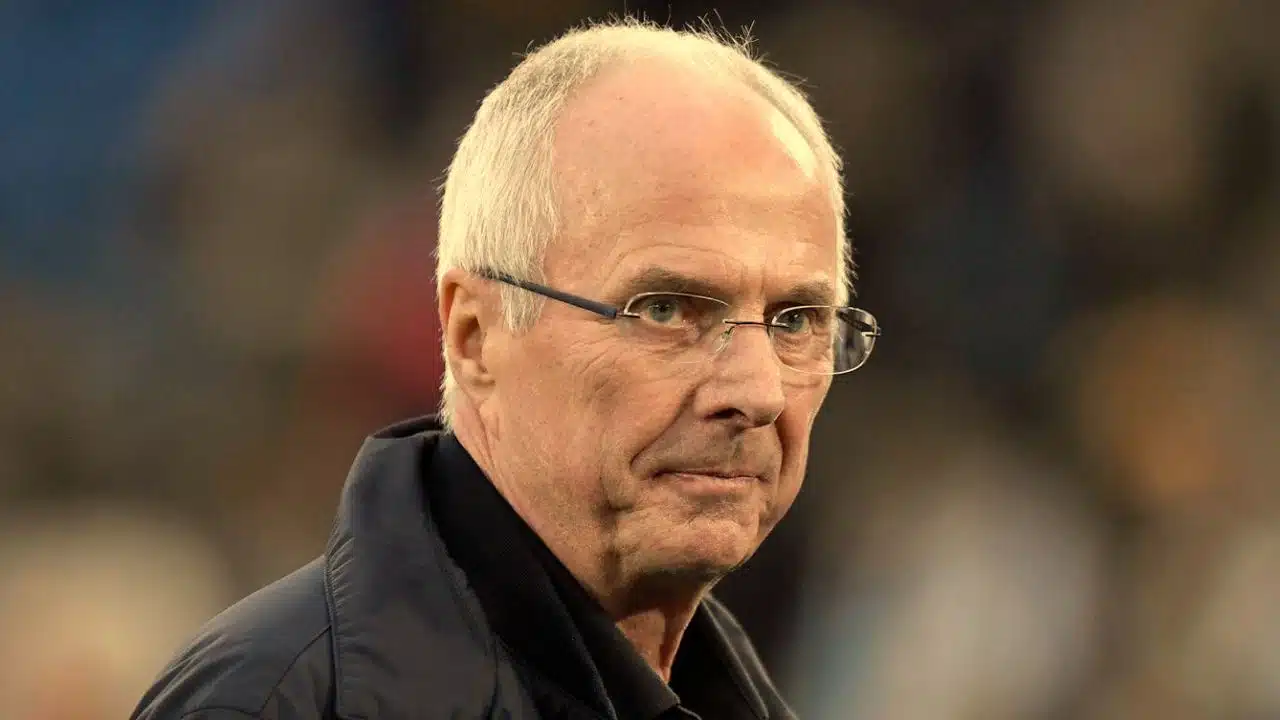In a heartfelt tribute, Prince William hailed Sven-Goran Eriksson as a “true gentleman” after the former England manager passed away on Monday. Eriksson, aged 76, succumbed to terminal cancer, a battle he had openly shared with the public earlier this year. Surrounded by his family, Eriksson took his final breath, leaving behind a legacy that has deeply influenced the football world.
Sven-Goran Eriksson’s Courageous Battle Against Cancer
The news of Eriksson’s death was met with widespread sorrow, as the football community and fans worldwide mourned the loss of a man who had significantly impacted the game. In January, Eriksson revealed that he had been diagnosed with terminal cancer, and doctors had given him “at best” a year to live. This candid disclosure of his illness only added to the admiration many had for him, showing his strength and resilience even in the face of such a daunting challenge.
Eriksson’s decision to share his diagnosis publicly was not just a testament to his transparency but also an opportunity to raise awareness about the disease. His openness allowed his fans, colleagues, and loved ones to prepare for the inevitable, while also providing a platform for Eriksson to reflect on his illustrious career and the life he had lived.
A Trailblazer for England as the First Foreign Manager
Sven-Goran Eriksson’s name will forever be etched in football history as the first foreign manager to take the helm of the England national team. His appointment in 2001 marked a significant shift in the FA’s approach to leadership, reflecting the growing globalization of football. Eriksson, a Swedish national, was already an established figure in European football, having managed top clubs such as Lazio, Benfica, and IFK Göteborg.
During his tenure with the England team, Eriksson led the squad to the quarter-finals of the FIFA World Cup twice, in 2002 and 2006, as well as to the same stage in the 2004 UEFA European Championship (Euro 2004). These achievements, while not delivering a major trophy, were nonetheless significant for a team that had been seeking to recapture the glory of their 1966 World Cup victory.
Prince William, who serves as the president of the English Football Association (FA), had the opportunity to meet Eriksson on several occasions. Reflecting on his experiences with the manager, Prince William expressed his deep sorrow over Eriksson’s passing on the social media platform X (formerly known as Twitter). He wrote, “Sad to hear about the passing of Sven-Goran Eriksson. I met him several times as England manager and was always struck by his charisma and passion for the game. My thoughts are with his family and friends. A true gentleman of the game.”
Eriksson’s Legacy with the England Team
While Sven-Goran Eriksson may not have secured a major trophy for England, his tenure was marked by several memorable performances that have become part of the nation’s football folklore. Perhaps the most iconic of these was the 5-1 victory over Germany in a World Cup qualifier in September 2001. This match, held in Munich, saw the England team deliver a stunning performance that remains one of the most celebrated moments in English football history.
Eriksson’s tactical acumen and calm demeanor under pressure were often highlighted as key factors in his ability to guide the England team through challenging matches. His approach to management, characterized by meticulous preparation and a focus on teamwork, resonated with players and fans alike.
Mark Bullingham, the CEO of the FA, paid tribute to Eriksson, emphasizing the lasting impact he had on English football. “This is a very sad day,” Bullingham said. “He gave all England fans such special memories. No one can ever forget the 5-1 victory in Munich against Germany under Sven’s guidance.”
Bullingham continued, “Sven will be rightly recognized and forever remembered for his significant work with the England team, and for his wider contribution to the game. On behalf of my colleagues at The FA, past and present, our thoughts are with his friends and family today. He will be much missed, and we will pay tribute to him when we play Finland at Wembley next month.”
The Enduring Influence of Eriksson’s Club Management Career
Beyond his role with the England national team, Sven-Goran Eriksson’s influence extended across Europe, where he managed several top clubs with considerable success. His managerial career spanned over four decades, during which he earned a reputation for his strategic thinking, leadership skills, and ability to get the best out of his players.
Eriksson’s success began in Sweden with IFK Göteborg, where he won the UEFA Cup in 1982. This victory brought him to the attention of top European clubs, leading to his subsequent appointments with teams such as Benfica in Portugal and Lazio in Italy. With Benfica, Eriksson won multiple Portuguese league titles, solidifying his status as one of Europe’s top managers.
However, it was with Lazio that Eriksson truly made his mark on the international stage. Under his leadership, Lazio won the Serie A title in 2000, along with several other domestic and European trophies, including the UEFA Cup Winners’ Cup in 1999. Eriksson’s ability to build cohesive teams that performed well under pressure made him a sought-after manager across Europe.
Following his time with the England national team, Eriksson continued to manage at the club level, taking the reins at Manchester City during the 2007-08 Premier League season. Manchester City, a club with grand ambitions, saw Eriksson as the right figure to lead them into a new era. His time at City was marked by some notable successes, although his tenure lasted only a season.
In light of Eriksson’s passing, Manchester City issued a statement expressing their condolences: “We would like to express our sincere condolences to the family and friends of Sven-Goran Eriksson, who has passed away at the age of 76. Rest in peace, Sven.”
A Touching Farewell from Liverpool and UEFA
One of Eriksson’s final football-related appearances was in March 2024, when he was invited by Liverpool FC to fulfill a lifelong dream. The club offered him the opportunity to manage the team in a charity match held at Anfield. This gesture by Liverpool was not only a testament to Eriksson’s status in the football community but also provided him with a poignant final memory connected to the sport he loved.
Liverpool FC, in their tribute to Eriksson, stated: “Rest in peace, Sven-Goran Eriksson. The thoughts of everyone at the club are with Sven’s family and friends at this extremely sad time.”
Eriksson’s impact on European football did not go unnoticed by UEFA, the governing body of football in Europe. In their statement, UEFA highlighted Eriksson’s significant achievements, particularly his success in European competitions. “On behalf of the European football community, everybody at UEFA is deeply saddened to learn of the passing of Sven-Goran Eriksson. A beloved figure in the game, Sven was a UEFA Cup winner as coach of IFK Göteborg in 1982 before leading Lazio to the UEFA Cup Winners’ Cup in 1999. Rest in peace, Sven.”
A Legacy That Will Endure
Sven-Goran Eriksson’s influence on football extended well beyond the teams he managed. His approach to the game, characterized by a calm and analytical style, inspired a generation of managers and players. Eriksson’s legacy is one of innovation, professionalism, and dedication to the sport.
As tributes continue to pour in from around the world, it is clear that Sven-Goran Eriksson will be remembered not just for his achievements on the pitch, but also for the way he conducted himself off it. His integrity, humility, and passion for football made him a beloved figure across the globe.
While Eriksson may have passed away, his contributions to football will continue to be celebrated for years to come. The football community, from fans to players to fellow managers, will always hold him in high regard as a man who left an indelible mark on the beautiful game.
The Information is Collected from ESPN and Yahoo.






































